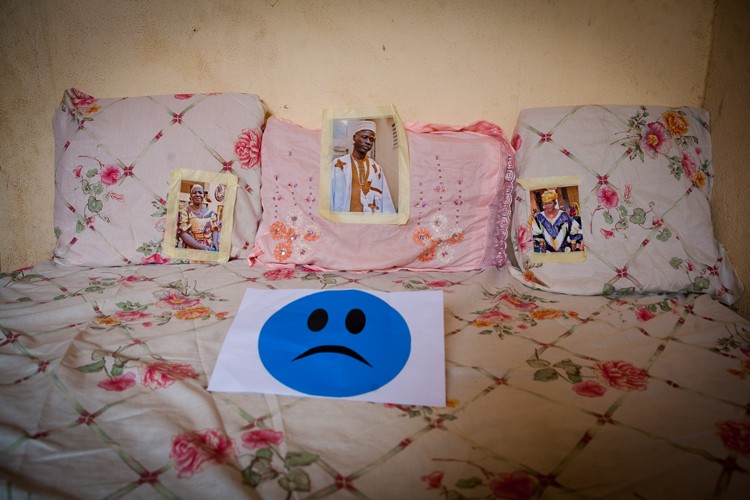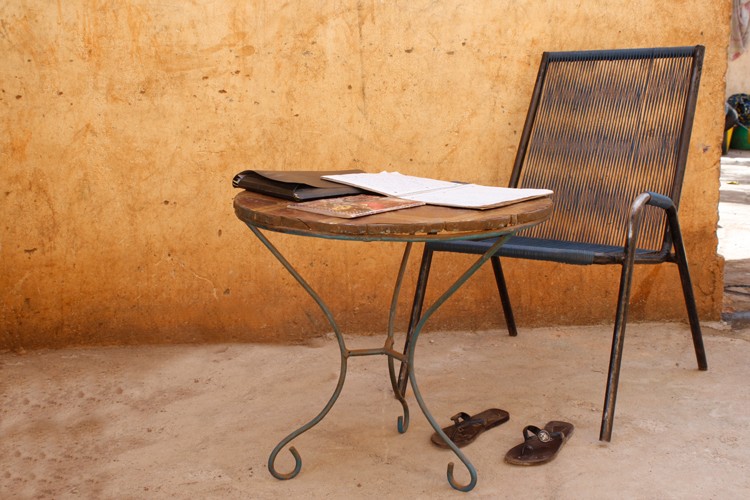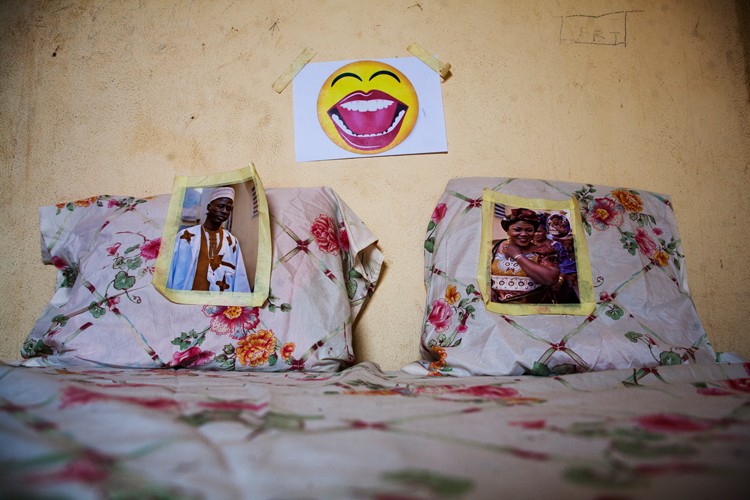Rokiatou: The torn wife
Rokiatou Camara was born in Bamako in 1982 as the youngest of eight brothers and sisters. The first four years of her life, she spent in a small village in the region of Gao. Her mother was a housewife and her father worked for a textile company. Money was always scarce and it was more important to provide the whole family with food than single children with education. After the sudden death of her mother, she was given to the wife of her father’s boss in Bamako.
By Susann Ludwig
Rokiatou was born in Bamako in 1982 as the youngest of eight brothers and sisters. Her father’s boss’s wife raises her, cares for her and sends Rokiatou to school. Thanks to her, she calls herself an educated and self-confident woman. She enrolls in socio-anthropology at the University of Bamako. “We are considered to be society’s doctors”, she explains. After graduation, she quickly starts working for NGOs: does interviews, translations and field research.
In 2014, Rokiatou marries her boyfriend Dolo. The two of them studied together and he has constantly made serious efforts to win her affection. They went out; he bought her presents and called her whenever they were separated. Rokiatou is the happiest woman, when he asks her to marry him – only that there is this other wife; Dolo’s first wife. Rokiatou does not want to be the second wife, but her whole family already knew that Dolo proposed. His first wife did not go to school and they married only for his mother’s sake. With Rokiatou, it is different – this is love, he assures her. After their wedding, he spends every second night with her, but he always shows up for dinner. Soon Rokiatou gets pregnant, which forces her to stay at home in her own apartment.
Well, I’m not going to say that its good, because I’m pretty bored. Staying at home during all this time not doing anything is horrifying to me. Even if my husband makes things do. It’s horrible to see him as the only one working. […] I need to find an employment as well in order to do something for my parents and to support my husband a little.
Photograph: Mamadou Ouattara, CFP Bamako, 2015
In 2014, the three of them and their children move in together. In their new house, the two women’s bedrooms are next to each other. Dolo strictly follows the rules of polygamous marriages and spends alternately two nights with one wife and two nights with the other. Rokiatou calls the fellow wife “my sister”; however, she cannot stop thinking about how beautiful life could be without her. There are no disputes; she does not want Dolo to get the impression that she is nasty.
Her son Bakary was born five months ago. He looks like his daddy; he is her angel. Due to the new living conditions and her motherhood, a lot of things have changed. She is occupied all day feeding the baby, doing housework and waiting for her husband to come home. He says that town is too dangerous for a young mother. She understands and stays at home.
Photograph: Fanta Diarra, CFP Bamako, 2015
Rokiatou est née en 1982, la benjamine d’une famille de huit enfants. Elle est élevée par l'épouse du patron de son père. Grâce à cette dame qu’elle appelle affectueusement maman, Rokiatou se considère comme une femme instruite et confiante. Elle s’inscrit à l'Université de Bamako en socio-anthropologie. « Nous sommes considérés comme les médecins de la société ! », affirme-t-elle.
Après ses études, elle commence rapidement à travailler dans les ONG pour lesquelles elle fait des interviews, des traductions et des enquêtes de terrain.
 Photograph: Fanta Diarra, CFP Bamako, 2015
Photograph: Fanta Diarra, CFP Bamako, 2015
En 2014, Rokiatou se marie à son petit ami Dolo avec qui elle a fait les études. Il a toujours fait des efforts pour gagner son affection par des sorties, des cadeaux et des appels. Elle est la femme la plus heureuse quand il l’a épousée, seulement il avait déjà une autre femme. Rokiatou n’avait jamais voulu être deuxième épouse. Il s’est marié à une femme qui n’est pas partie à l’école suivant la volonté de sa mère. Avec Rokiatou, c'est l'amour et il la rassure. Après leur mariage, il passe chaque deuxième nuit avec elle et il vient toujours pour le dîner. Plus tard, Rokiatou tombe enceinte, ce qui l'oblige à rester à la maison dans son propre appartement.
Bon, je ne dirais pas que c'est bon, parce que moi-même je m'ennuie. J'ai horreur de rester à la maison pendant tout ce temps sans rien faire. Même si mon mari se débrouille. […] J'ai horreur de le voir seul travailler. […] Il faut que je me cherche un travail aussi, pour pouvoir faire quelque chose à mes parents aussi et aider un peu mon mari.
Peu de temps après, les trois emménagent ensemble dnas la même maison. Son mari suit strictement les règles du mariage polygame qui sont deux nuits avec l'une et deux nuits avec l'autre. Rokiatou appelle sa coépouse "ma soeur", mais ne peut arrêter de penser comment sa vie pourrait être sans elle. Mail il n'y a jamais eu de dispute entre elles. Son fils Bakary de cinq mois ressemble beaucoup à son père. Elle l’appelle « mon ange ». Maintenant, elle est occupée toute la journée à faire le ménage et à prendre soin de son enfant en attendant le retour de son mari. Dolo estime dangereux que Rokiatou jeune mère parte en ville. Elle accepte donc de rester à la maison.


